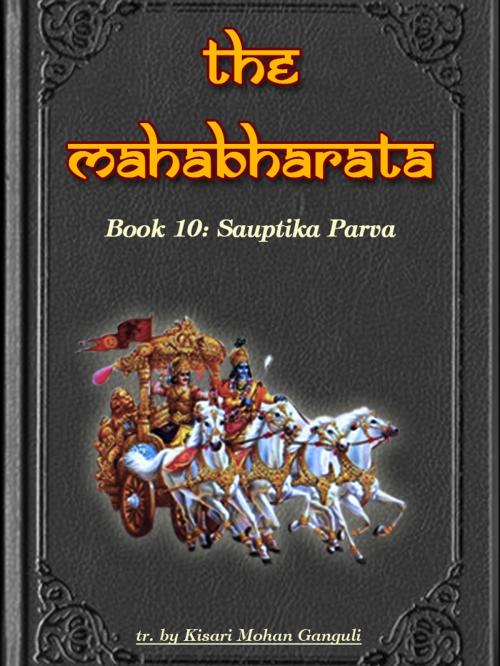The Mahabharata, Book 10: Sauptika Parva
Nonfiction, Religion & Spirituality, Eastern Religions, Hinduism, Inspiration & Meditation, Spirituality, History| Author: | Kisari Mohan Ganguli | ISBN: | 1230000036168 |
| Publisher: | AppsPublisher | Publication: | December 3, 2012 |
| Imprint: | Language: | English |
| Author: | Kisari Mohan Ganguli |
| ISBN: | 1230000036168 |
| Publisher: | AppsPublisher |
| Publication: | December 3, 2012 |
| Imprint: | |
| Language: | English |
The Mahabharata, Book 10: Sauptika Parva
Kisari Mohan Ganguli, tr.
Om! Having bowed down to Narayana, and Nara the foremost of male beings, and the goddess Saraswati also, must the word Jaya be uttered.
It is of immense importance to the culture of the Indian subcontinent, and is a major text of Hinduism. Its discussion of human goals (artha or purpose, kama or pleasure, dharma or duty/harmony, and moksha or liberation) takes place in a long-standing tradition, attempting to explain the relationship of the individual to society and the world (the nature of the 'Self') and the workings of karma.
The object of a translator should ever be to hold the mirror upto his author. That being so, his chief duty is to represent so far as practicable the manner in which his author's ideas have been expressed, retaining if possible at the sacrifice of idiom and taste all the peculiarities of his author's imagery and of language as well. In regard to translations from the Sanskrit, nothing is easier than to dish up Hindu ideas, so as to make them agreeable to English taste. But the endeavour of the present translator has been to give in the following pages as literal a rendering as possible of the great work of Vyasa. To the purely English reader there is much in the following pages that will strike as ridiculous. Those unacquainted with any language but their own are generally very exclusive in matters of taste. Having no knowledge of models other than what they meet with in their own tongue, the standard they have formed of purity and taste in composition must necessarily be a narrow one. The translator, however, would ill-discharge his duty, if for the sake of avoiding ridicule, he sacrificed fidelity to the original. He must represent his author as he is, not as he should be to please the narrow taste of those entirely unacquainted with him. Mr. Pickford, in the preface to his English translation of the Mahavira Charita, ably defends a close adherence to the original even at the sacrifice of idiom and taste against the claims of what has been called 'Free Translation,' which means dressing the author in an outlandish garb to please those to whom he is introduced.
Sanjaya said, "Those heroes then together proceeded towards the south. At the hour of sunset they reached a spot near the (Kuru) encampment. Letting their animals loose they became very much frightened. Reaching then a forest, they secretly entered it. They took up their quarters there at no great distance from the encampment. Cut and mangled with many keen weapons, they breathed long and hot sighs, thinking of the Pandavas. Hearing the loud noise made by the victorious Pandavas, they feared a pursuit and therefore fled towards the east. Having proceeded for sometime, their animals became tired and they themselves became thirsty. Overpowered by wrath and vindictiveness, those great bowmen could not put up with what had occurred, burning as they did with (grief at) the slaughter of the king. They however, took rest for a while."
Dhritarashtra said, "The feat, O Sanjaya, that Bhima achieved seems to be incredible, since my son who was struck down possessed the strength of 10,000 elephants. In manhood's prime and possessed of an adamantine frame, he was not capable of being slain by any creature! Alas, even that son of mine was struck down by the Pandavas in battle! Without doubt, O Sanjaya, my heart is made of adamant, since it breaks not into a 1,000 fragments even after hearing of the slaughter of my hundred sons! Alas, what will be the plight of myself and my spouse, an old couple destitute of children! I dare not dwell in the dominions of Pandu's son! Having been the sire of a king and a king myself, O Sanjaya, how shall I pass my days as a slave obedient to the commands of Pandu's son! Having laid my commands over the whole Earth and having stayed over the heads of all, O Sanjaya, how shall I live now as a slave in wretchedness? How shall I be able, O Sanjaya, to endure the words of Bhima who hath single-handed slain a full hundred sons of mine? The words of the high-souled Vidura have come to be realised! Alas, my son, O Sanjaya, did not listen to those words! What, however, did Kritavarma and Kripa and Drona's son do after my son Duryodhana had been unfairly stuck down?"
The Mahabharata, Book 10: Sauptika Parva
Kisari Mohan Ganguli, tr.
Om! Having bowed down to Narayana, and Nara the foremost of male beings, and the goddess Saraswati also, must the word Jaya be uttered.
It is of immense importance to the culture of the Indian subcontinent, and is a major text of Hinduism. Its discussion of human goals (artha or purpose, kama or pleasure, dharma or duty/harmony, and moksha or liberation) takes place in a long-standing tradition, attempting to explain the relationship of the individual to society and the world (the nature of the 'Self') and the workings of karma.
The object of a translator should ever be to hold the mirror upto his author. That being so, his chief duty is to represent so far as practicable the manner in which his author's ideas have been expressed, retaining if possible at the sacrifice of idiom and taste all the peculiarities of his author's imagery and of language as well. In regard to translations from the Sanskrit, nothing is easier than to dish up Hindu ideas, so as to make them agreeable to English taste. But the endeavour of the present translator has been to give in the following pages as literal a rendering as possible of the great work of Vyasa. To the purely English reader there is much in the following pages that will strike as ridiculous. Those unacquainted with any language but their own are generally very exclusive in matters of taste. Having no knowledge of models other than what they meet with in their own tongue, the standard they have formed of purity and taste in composition must necessarily be a narrow one. The translator, however, would ill-discharge his duty, if for the sake of avoiding ridicule, he sacrificed fidelity to the original. He must represent his author as he is, not as he should be to please the narrow taste of those entirely unacquainted with him. Mr. Pickford, in the preface to his English translation of the Mahavira Charita, ably defends a close adherence to the original even at the sacrifice of idiom and taste against the claims of what has been called 'Free Translation,' which means dressing the author in an outlandish garb to please those to whom he is introduced.
Sanjaya said, "Those heroes then together proceeded towards the south. At the hour of sunset they reached a spot near the (Kuru) encampment. Letting their animals loose they became very much frightened. Reaching then a forest, they secretly entered it. They took up their quarters there at no great distance from the encampment. Cut and mangled with many keen weapons, they breathed long and hot sighs, thinking of the Pandavas. Hearing the loud noise made by the victorious Pandavas, they feared a pursuit and therefore fled towards the east. Having proceeded for sometime, their animals became tired and they themselves became thirsty. Overpowered by wrath and vindictiveness, those great bowmen could not put up with what had occurred, burning as they did with (grief at) the slaughter of the king. They however, took rest for a while."
Dhritarashtra said, "The feat, O Sanjaya, that Bhima achieved seems to be incredible, since my son who was struck down possessed the strength of 10,000 elephants. In manhood's prime and possessed of an adamantine frame, he was not capable of being slain by any creature! Alas, even that son of mine was struck down by the Pandavas in battle! Without doubt, O Sanjaya, my heart is made of adamant, since it breaks not into a 1,000 fragments even after hearing of the slaughter of my hundred sons! Alas, what will be the plight of myself and my spouse, an old couple destitute of children! I dare not dwell in the dominions of Pandu's son! Having been the sire of a king and a king myself, O Sanjaya, how shall I pass my days as a slave obedient to the commands of Pandu's son! Having laid my commands over the whole Earth and having stayed over the heads of all, O Sanjaya, how shall I live now as a slave in wretchedness? How shall I be able, O Sanjaya, to endure the words of Bhima who hath single-handed slain a full hundred sons of mine? The words of the high-souled Vidura have come to be realised! Alas, my son, O Sanjaya, did not listen to those words! What, however, did Kritavarma and Kripa and Drona's son do after my son Duryodhana had been unfairly stuck down?"















